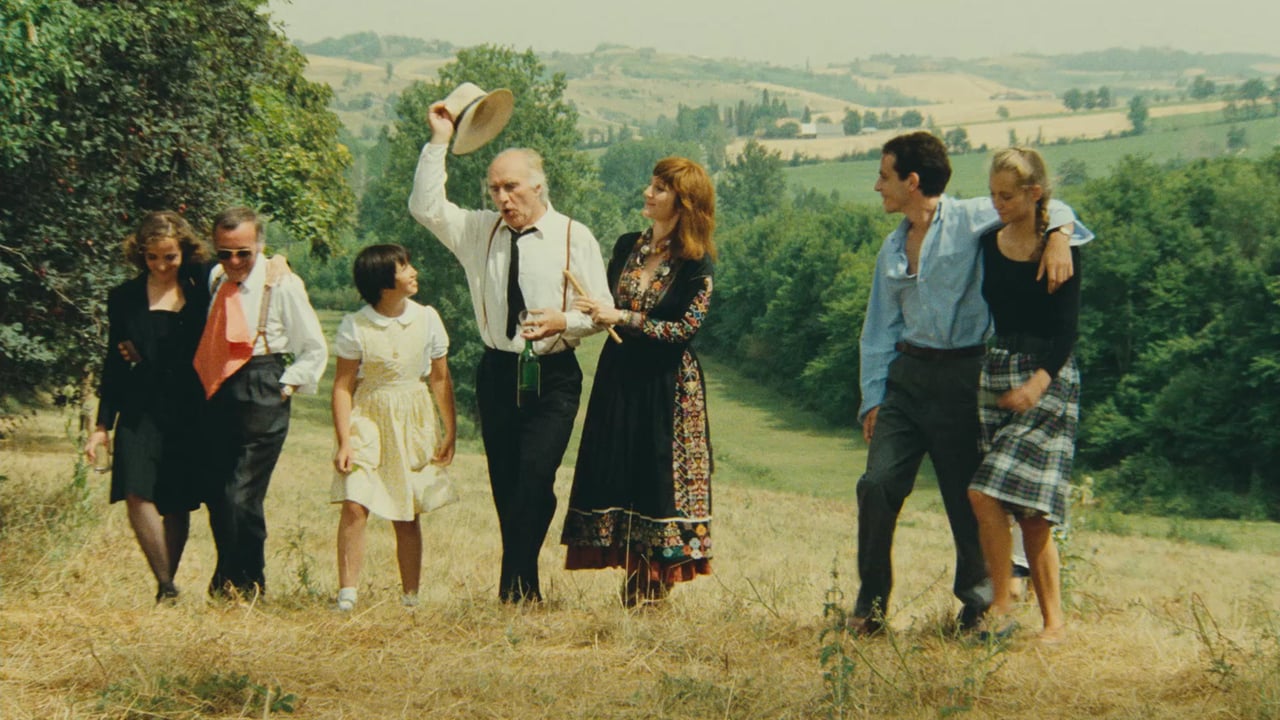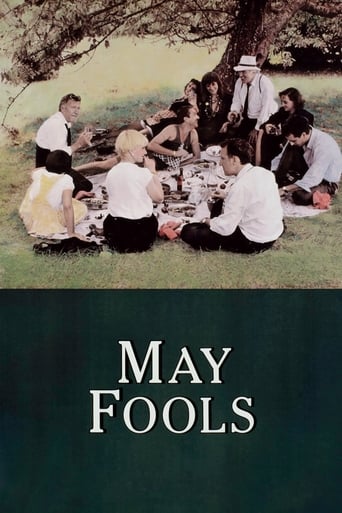Cathardincu
Surprisingly incoherent and boring
Dorathen
Better Late Then Never
Madilyn
Not sure how, but this is easily one of the best movies all summer. Multiple levels of funny, never takes itself seriously, super colorful, and creative.
Cody
One of the best movies of the year! Incredible from the beginning to the end.
Charlot47
While France is threatening to erupt into revolution during the beautiful spring weather of May 1968, a family of the haute bourgeoisie assembles at a large country house in the lovely Gers area of the South-West for the funeral of the matriarch and the division of her goods. The former is delayed because municipal workers, including the gravediggers, have all gone on strike, while the latter is disrupted by two events. First, the notary arrives to read the will, which gives 25% of movables to the young housekeeper, who has been comforting the eldest son Milou, leaving only 75% for the family. Then the old lady's jewels are found short, raided by a granddaughter who promptly renews an old association with the notary in the hay loft.So the time passes, between and during meals, with wrangles over material goods and many amatory diversions. One might almost think that this group of people, most of whom who have little or no concern about the events convulsing their country, are interested only in food, money and sex, plus a bit of music and marijuana. Aftre alarming reports of impending disaster on the radio and from rich neighbours, panic seizes them. Abandoning the delightful house and without taking anything useful, they irrationally hide in the woods. Cold, wet and hungry, they are saved by the housekeeper, who finds them to give the news that President de Gaulle is back in charge of the nation and everything will return to normal. After at last burying the old lady, the family return to their preoccupations: the spectre of revolution has passed.Altogether it could be a posthumous piece by Buñuel, which is not surprising as the script is by his long-lived and prolific collaborator, Jean-Claude Carrière. Surrealism has several outings, from the opening where the eldest son calms his bees by declaiming Latin verse to the ending where his dead and buried mother returns to the empty house to dance with him. While the impotence of the bourgeoisie, imprisoned in their obsessions, recalls the trapped party in "El ángel exterminador" as well as the couples on their inescapable carousel in "Le charme discret de la bourgeoisie", the subsequent flight into wilds that are not Eden evokes "La muerte en este jardín". In the end, the character who really shows common sense and care for others is the housekeeper, a working-class woman.Despite many echoes of the provocative Spanish maestro, this work is wholly French in feeling and execution. Even the one foreign actress, Harriet Walter playing an Englishwoman, speaks the language excellently.
Tim Kidner
I've long felt that Louis Malle was my favourite French director. Pushing out the cinematic envelope with his honest perceptions about real people, but with a sort of steady verve. They can be challenging, always absorbing but none like Milou in May -which is one of wonderfully loose 'no lectures today' sort of light comedies about the country-set all getting hot and bothered about sorting out funeral arrangements. The fact is that there's a national strike which causes difficulties for the various interested parties in getting there and that Paris is literally burning with the '68 student riots. But those same facts are wonderfully incidental, revealing maybe how different the upper middle class country retreats are away from poor, clashing students in the big City. Physically, socially and economically.A playful Stefan Grapelli score delights, with a lush, so lush (it IS May) cinematography which added the cream on top of the cake, with added witty dialogue, and almost fantastical characters. They might be a little caricatured, but with an oh! so, charismatic lead. We all dreamed of uncles like that when we were ten years old! As they hang about waiting for the rest to turn up, the lazy, hazy May afternoon strolls on, with a wisp of sex and drug taking, it's an intoxicating blend of slight naughtiness to spice up a usually (for most people) unpleasant but necessary gathering.This is Kodachrome Malle, rather than his monochrome.
Luis Guillermo Cardona
Louis Malle was one of the most notable members of the Nouvelle Vague (New Wave) french movement that was an alternative to film reconstructions historical and literary adaptations commonly "infidels" as they used to do filmmakers Delannoy, Autant-Lara and some others, because, unlike these, the New Wave advocated an approach to the problem of the individual to privacy, their personal experiences. But like the rest of their comrades (with the exception of Truffaut), Louis Malle also realized that this new path, it could anchor a bourgeois and individualistic conception of life and needed to be linked to analysis of social problems, seeking more openness and greater narrative ideological commitment. So did "Lacombe Lucien", an energetic recreation of the effects left by fascism. And, among others, "Alamo Bay", on the reaction of the Vietnamese Americans living there, after the failure of the war.Until that arrives "MILOU EN MAI", a metaphor for the state and the system, full of irony and black humor of the finest. Milou's mother, Mrs. Vieuzac, is representing the state: the owner of everything. Their children, grandchildren and sons-in-law, are the bourgeoisie, owners of power in the state. Claire, the maid, is the proletariat, the heir to only a quarter of the estate of Mrs. Vieuzac. The main prototypes come to life: the landowner, the reactionary intellectual, trader, bourgeois ladies... With a delicious dialogue through participation in the old script by Luis Bunuel collaborator Jean Claude Carriere ("Now women complicated everything. Before they knew it was not an orgasm and it was easier"), a delightful musical score with the great jazz style of Stephane Grappelli, and beaten with that herd, Louis Malle reconstructs the warm and vibrant time of May 68', in which there was a social class who knew everything, understood everything and was consistent with everything... until that any solace to meddle in its liabilities.In a wonderful characterization, Michel Piccoli represents Milou, the provincial intellectual who suddenly is surrounded by its unique family at the announcement of the death of his mother. When that nice breed, feel that the facts are about to touch them directly, they decide to leave the field (are excluded). What follows is better that you see it, you'll find people have probably already seen in your neighborhood or on your street and you'll realize, perhaps, that many things are not as they seem. "MILOU EN MAI", is a piece of film hard to forget.
writers_reign
Malle made only two films after this one, Damage, and Vanya On 42nd Street and it's tempting to view Milou en Mai as a rehearsal for Vanya though in the end the differences outweigh the similarities. It IS set on a country estate that is running to seed and there IS a 'Vanya' figure in Milou himself (Michel Piccoli) who more or less tends the estate in the absence of his siblings - one deceased, one pursuing his own career. There IS a family gathering with all that that implies, bickering, truth-telling, laughter, tears, accusations, recriminations etc. Perhaps above all it is a MOOD piece which does put it in the same universe as Chekhov but it is ultimately too easy to read it in this way. It was a masterstroke to place it at the time of the student riots in Paris, May, 1968 and this strengthens the links with Chekhov who, of course, wrote his own masterpieces at a time when Russia was undergoing changes unacknowledged by his gentlefolk with their heads in the metaphorical sand of dachas serenely remote from the turbulence. This is a film of great lyricism and melancholia with a gentle Jazz music score by Stephane Grappelly and the action, such as it is, is kick-started by the death of Milou's mother which necessitates summoning the family for the funeral. Again like Chekhov what we have here is an ensemble piece rather than Leading Man, Leading Lady, Juvenile, Ingenue, etc and the acting is uniformly excellent from Miou-Miou as Milou's daughter, Camille, to Francois Berleand as the family lawyer who drives a red Alfa Romeo and still carries a torch for Camille, to Valerie Lemercier in the small but telling role of Madame Boutelleau. The events in far-off Paris punctuate but are not allowed to dominate and barely to influence the action leaving the family - and non-family - to quarrel, couple, fail-to-couple and relate the occasional home truth. In short a lovely Autumnal movie.

